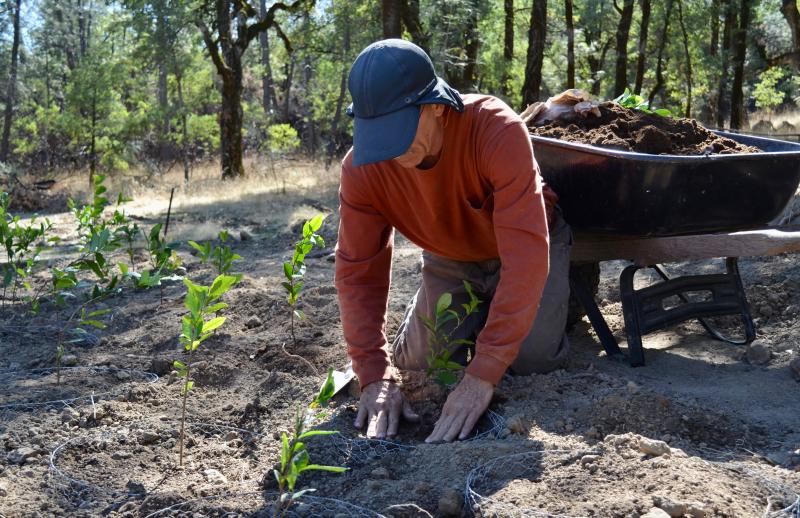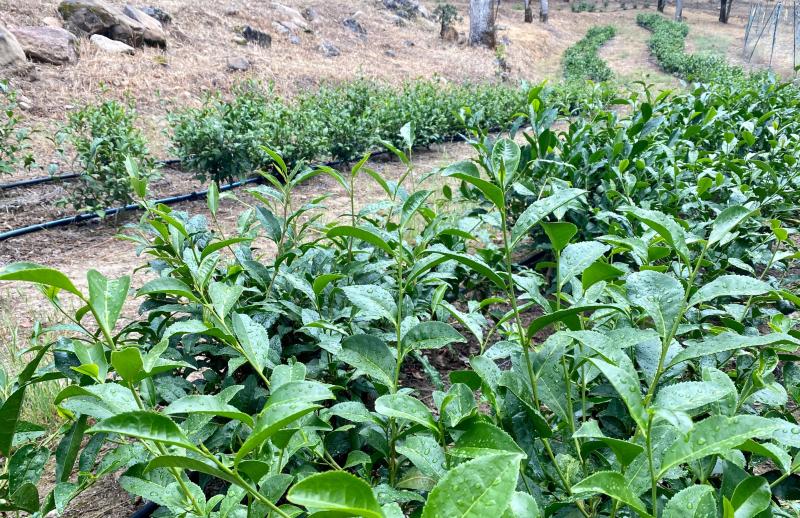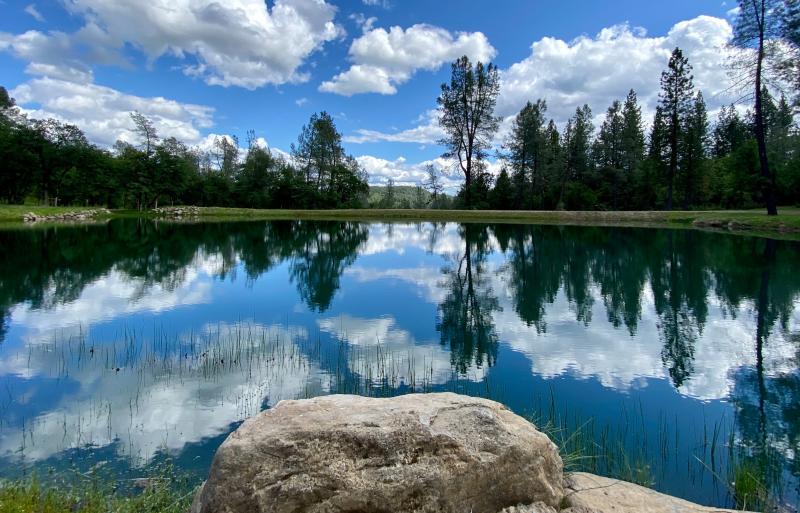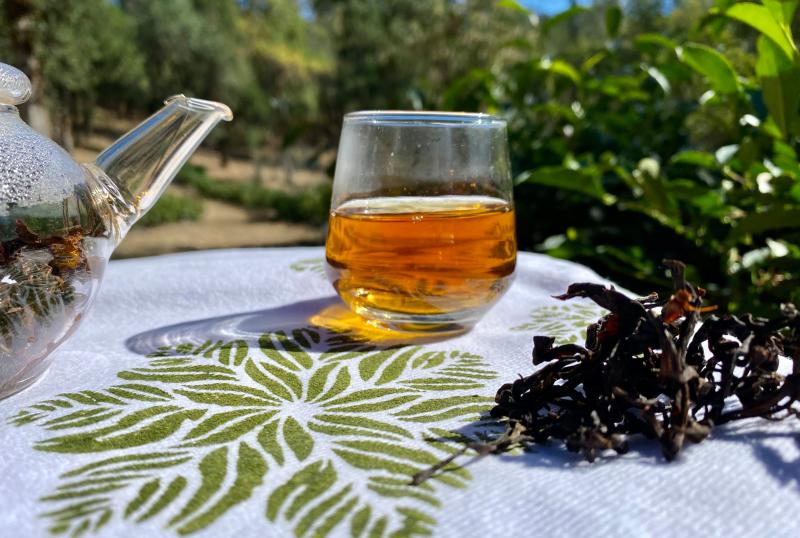Jeremy Wickenheiser and his father Richard are co-owners and farmers at Bella Vista Tea Company, a 161-acre farm that’s located east of Bella Vista in Northern California – a former lumber town that means “beautiful view” in Spanish.
Currently, a half-acre of the farm is planted with tea, but this will expand in the next year to an acre. Their mission is to grow, harvest and handcraft farm-to-cup specialty teas while simultaneously providing an agritourism space for tea enthusiasts to learn about tea and connect.
“We believe that each tea tells a story,” said Wickenheiser. “When we drink tea, not only do we connect to the farmers and the land where the tea was grown, but we connect to the essence of nature. Tea invites us to slow down and foster connection first with ourselves and then with others.”

Wickenheiser is an award-winning educator who taught multiple subjects over the past 16 years, ranging from biology to physics to entrepreneurship. He created a solar car engineering program, advised a team to the national finals of an engineering design competition, and founded and scaled a 7th- to 12th-grade entrepreneurial studies program for students. During his career, he also coached hundreds of startup companies across multiple industries.
Wickenheiser’s father, Richard, is a board-certified internal medicine physician with a degree in electrical and electronics engineering with a sub-speciality in biomedical engineering. He worked in clinical and administrative medicine from 1983 to 2017 and was involved with developing one of the first electronic medical records. In addition to private practice, Richard served as the Tehama County health officer in California. While retired now, he was called back to lead the county during the COVID-19 pandemic in 2020.
On an Exciting Journey in the World of U.S.-Grown Tea
With distinguished backgrounds, the two fledgling tea farmers are on an exciting journey that officially started when they planted their first 330 tea plants in October 2019. They formally established Bella Vista Tea Company in January 2020, but they started researching and working on the concept in 2017, after Wickenheiser made his fourth trip to East Africa and his first trip to India.
“We are most excited about creating an experience where consumers can learn about tea and different tea traditions from around the world in one location,” shared Wickenheiser.
As a farm and agritourism-focused business, Bella Vista Tea Company plans to offer numerous activities for visitors, including tea tastings of teas produced at the farm, “chanoyu” in an authentic Japanese teahouse, farm stays, tea production workshops and retreats, and activities like guided hikes and paddleboard yoga, among other happenings. They also believe that agritourism can be virtual, so they plan to hold virtual tea tastings and activities online too, for those that aren’t able to travel to the farm.

In addition, Bella Vista Tea Company intends to collaborate with and highlight local rural businesses, to support them in reaching a new audience. “This might include collaborating with a local potter on creating a limited edition set of teacups or blending our tea with botanicals grown by a local farmer,” said Wickenheiser. “We believe that Bella Vista Tea Company can bring a new and different consumer to our local community, which will positively impact our local economy.”
The Bella Vista Tea Company farm is currently on schedule to open to tea enthusiasts in the spring of 2023. In 2024, they plan to open the “farm stay” portion of the business and continue as an FDA-approved tea processing facility.
A Focus on Biodiversity, Long-Term Stewardship of the Land
Wickenheiser’s dad purchased the first parcel of land that makes up the Bella Vista Tea Company in 2008, after seeing an ad in The Nickel (a locally printed publication, similar to Craigslist). “Since then, we have established four spring-fed reservoirs stocked with bass and trout, plus miles of hiking trails,” said Wickenheiser.
The farm itself is at 2,000 feet elevation and sits in an oak woodlands transition zone (a mixture of oaks and pine trees) with views of Mt. Lassen and Mt. Burney. Annually, they receive between 50 to 72 inches of rain.
The farm is entirely off-grid and incredibly tranquil, according to Wickenheiser. “It is home to many species of wildlife including deer, turkey, bear, rabbit and fox," he said. "Each year, migratory birds such as ducks and geese visit the farm. In terms of growing tea, I believe we are showing that tea will grow here. But it is more nuanced than that since it is about identifying the cultivars best suited to our specific microclimate.”

The two farmers at Bella Vista Tea Company have sought out a wide variety of Camellia sinensis cultivars to plant at the farm. Currently, they have more than 1,000 tea plants in the ground and will add an additional 1,000 to 2,000 plants in the next one to two years, to fill an acre.
“Most of the tea plants at the farm are grown from seed and are from a mixture of many different cultivars,” said Wickenheiser. “We also have well-known varieties including Bohea, Long Jing 43, Fu Ding, Jin Guan Yin and Benekaori. Since our farm is designed primarily for education, we have a unique opportunity to do things that would not make sense for a tea plantation, such as space some tea plants to allow them to grow into trees.”
Wickenheiser and his father also started growing their own tea plants from cuttings, and next year they will begin growing plants from seed. “We can then select and grow the cultivars best suited for our microclimate,” explained Wickenheiser. “We will use these tea plants to expand the farm and also sell them to local tea enthusiasts who want to grow their own tea at home.”
In 2023, the farm will plant botanicals – a number of them native to California – to blend with their teas. “We also want to build genetic diversity to make the farm more resilient,” noted Wickenheiser. “We know that each decision we make will have a long-lasting impact, so we are thoughtfully building a place that will allow for long-term stewardship of the land. Overall, this makes establishing the farm a slow process filled with trial and error.”

Educating Consumers About Growing Tea and Tea Production
Tea lovers who visit the Bella Vista Tea Company farm will have the opportunity to follow a tea's journey from seed to cup. “They will learn how tea plants are grown from both seed and cuttings in our nursery, participate in plucking and processing tea, and ultimately drink a tea they helped to make,” said Wickenheiser.
Since the farm assembled a collection of cultivars from around the world, visitors to the farm can also explore how tea is brewed and consumed in different cultures. For example, Wickenheiser said that visitors who participate in a tea harvest and processing workshop might brew a tea crafted from a Turkish cultivar in a samovar or a tea produced from a Chinese cultivar in a gaiwan.
Wickenheiser pointed out that most people in the United States live in urban cities and very few live and work on farms, making Bella Vista Tea Company and farm a unique experience for many.
“Agritourism creates connection,” Wickenheiser said. “It provides consumers the opportunity to connect with the individuals that grow their food. It also can provide immersive and educational experiences that equip people with the knowledge and resources to create their own agricultural products. And most importantly, it allows them to build a connection to the land such that it becomes part of their own story.”

Getting Support from the Tea Community, U.S. Tea Growers
While Wickenheiser and his father do not have a background in agriculture, they conducted a great deal of research, read many books and research papers, and talked with experts from the tea and agriculture communities.
Just some of the people that helped Bella Vista Tea Company along their journey, as they learned how to grow tea, include: Jason McDonald and Timothy Gibson of The Great Mississippi Tea Company; Virginia Utermohlen Lovelace, an independent tea consultant, writer and educator; Mark Gaskell and Ben Faber, farm advisers; Katharine Burnett and Jackie Gervay-Hague of UC Davis’ Global Tea Initiative; Jim Nuccio of Nuccio’s Nurseries; Kacie Merkel and Elizabeth Miller of Minto Island Tea Company; Mike Fritts of Golden Feather Tea; David Barron of Fleur De Lis Tea Company; and Angela McDonald of The U.S. League of Tea Growers.
Ultimately, Wickenheiser said it has been a lot of trial and error to determine what works best for their specific location and environment, in terms of growing tea. For instance, some of the tea plants they purchased died almost immediately when planted because they were unsuitable for their location.
Right now, Bella Vista Tea Company is hand-processing small batches of tea at the farm and sharing them with family and friends, and they’ve already purchased and imported all of the necessary tea processing machinery.
“We plan to construct an FDA-registered tea processing facility by spring of 2024,” revealed Wickenheiser. “We will offer a line of California-grown teas and botanicals including black, green and oolong teas. We are also interested in creating teas that honor different agricultural products grown in California, such as rice for a Genmaicha.”
This fall, Bella Vista Tea Company will launch an e-commerce site, offering a line of teaware and other unique items, including engraved wooden coasters produced at the farm, according to Wickenheiser, who also has a background in ceramics and plans to use wood from the trees to create some of the products, such as tea trays and tea tables.
Rescuing a Japanese Teahouse, Adding It to the Farm
Through his contacts, Wickenheiser recently learned about a developer that purchased a house in the San Francisco bay area. That house included a traditional Japanese teahouse in the backyard, which was going to be destroyed or removed before the new owner razed the property to build something new.
“While exploring if we could move the teahouse, and if so, what would be the best way, we learned who built the teahouse and when it was built [it was built in 1995],” said Wickenheiser. “In March 2022, we purchased the teahouse and are now in the final stages of having the teahouse wrapped in plastic and moved 200 miles to the farm.”
Wickenheiser said the teahouse is in good shape and when it arrives at the farm, a Japanese carpenter will complete some minor repairs. “The teahouse will be a place for people to gather for tea and experience Chanoyu,” he explained. “In the future, we would like to produce micro batches of matcha that can be served in the teahouse. We believe it is important to preserve the past while innovating for the future. The addition of the Japanese teahouse to the farm is an exciting part of that vision.”

'An Exciting Time to Be a Tea Farmer in the U.S.’
Overall, as more tea growers continue to pop up across the country, Wickenheiser said he believes it’s possible to grow tea successfully in the United States.
“Personally, I think it is an exciting time to be a tea farmer in the U.S. because there are opportunities to innovate while also learning from best practices developed around the world,” he said. “In the U.S. tea industry, there is a lot of collegiality and a willingness to collaborate and support each other. There is a sense that by collaborating, we can all create high-quality products that establish a strong brand for U.S. grown tea, which benefits all U.S. tea growers.”

To learn more about Bella Vista Tea Company, visit BellaVistaTea.com.
Plan to Attend or Participate in the
World Tea Conference + Expo, March 27-29, 2023
To learn about other key developments, trends, issues, hot topics and products within the global tea community, plan to attend the World Tea Conference + Expo, March 27-29, 2023 in Las Vegas, co-located with Bar & Restaurant Expo. Visit WorldTeaExpo.com.
To book your sponsorship or exhibit space at the World Tea Conference + Expo, or to enquire about advertising and sponsorship opportunities at World Tea News, contact:
Ellainy Karaboitis-Christopoulos
Business Development Manager, Questex
Phone: +1-212-895-8493
Email: [email protected]
Also, be sure to stay connected with the World Tea Conference + Expo on social media for details and insights about the event. Follow us on Twitter, Facebook, Instagram and LinkedIn.
